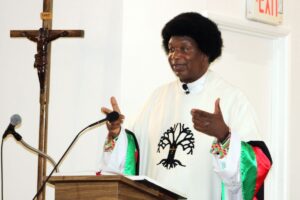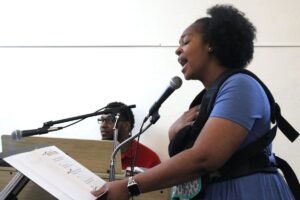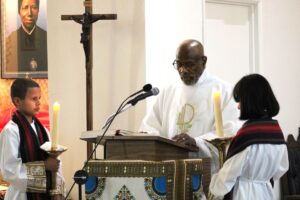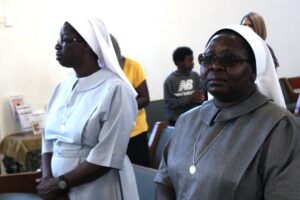First Juneteenth Mass underlines the Catholic value of freedom for all

For the first time, Catholics in the Diocese of Phoenix celebrated a mass in honor Juneteenth – the commemoration of the release of the last slaves after the Civil War – on Parish of St. Josephine Bakhita Mission in Phoenix on June 19th.
Although President Abraham Lincoln issued the Emancipation Proclamation on January 1, 1863, freeing all slaves in the states that had seceded, it was not until June 19, 1865, the end of the war, that Major General Gordon Granger and Union soldiers arrived in Galveston, Texas, to enforce the proclamation, thus freeing the last slaves in the former Confederate states. Juneteenth, also known as Freedom Day or Emancipation Day, has been celebrated since 1866 but was not recognized as a federal holiday until 2021, when President Joe Biden signed it into law.

In his homily at the Mass, St. Josephine’s pastor, Father Andrew McNair, who also serves as director of the Black Catholic Ministry for the Diocese of Phoenix, pointed out that although Juneteenth is not a liturgical holiday, it is still important to celebrate.
“As the people of God, we may always celebrate God’s revealed truths. And one of those truths that you should never forget is that God created you free,” he said. “As the people of God, it is right and just that we celebrate the fact that God created us free, free to love him, free to serve him, free to live in his creation.”
If we are created in His image and likeness, the priest said, then we are obligated to treat others that way and to approach them with compassion and mercy.
“When we start treating others as less than we are, we start to turn others into commodities and we don’t recognize their dignity as sons and daughters of the Almighty,” Father McNair said. “Juneteenth is an opportunity to recognize that dignity and decide – each of us, starting with myself – that I need to do better. I need to treat my brothers and sisters better, knowing that they are sacred to the Lord.”
He then urged the congregation that if Christians are redeemed by the blood of Jesus, we must not remain silent, but rather we must fight for the freedom of all, especially the freedom of Catholics.
“I was taught that the Catholic Church enjoys the fullness of Christian revelation. If that is the case, then it is up to us to step up, to be the first to defend our brothers and sisters in need, the first to help those who cannot help themselves,” he said. “May we continue the fight. Not everyone is free, and until everyone is free, none of us are truly fully free.”
He concluded his sermon by asking for the intercession of the parish patron, Saint Josephine Bakhita, who is considered the patron saint against human trafficking.


During the liturgy, the parish’s gospel choir, the Freedom Singers, joined together with the Umoja Youth Choir. Cory Dugar accompanied the choirs on the piano and noted that Juneteenth means freedom and liberation for him.
“When I played today, I tried my best to radiate freedom and expression through my playing, and I hope everyone felt that because today is a day to celebrate that freedom,” he said. “Also, I look at the spiritual side because sometimes we were bound to sin, but now we are free through Jesus. We are set free. It symbolizes freedom and redemption for all of God’s people.”
Parish member Victoria Valdez attended the mass with her two children while her husband accompanied the choir on drums. She spoke about how important it is for her as a Catholic to celebrate Juneteenth.
“As a Catholic, it’s really important to me to be pro-life, and I think that’s a big part of ending slavery of all kinds, human trafficking, everything,” she said. “It’s unbelievable that it only became a federal holiday two years ago. That’s crazy.”


Deacon Lorenzo McKnight recalls attending segregated schools in Forrest City, Arkansas, west of Memphis, Tennessee, until he graduated from high school in 1966. He remembers the segregated water coolers and restaurants that were common in the South at the time because of Jim Crow laws. He described attending liturgy as a “privilege.”
“I didn’t go to school with people of other races. I wasn’t integrated until I joined the Navy,” the deacon said. “It’s not quite over yet. We are on a journey and only God knows where it will end.”
Sister of the Sacred Heart of Jesus Betty Banja, who is Catholic Charities Refugee Resettlement Programalso participated in the liturgy. Originally from Sudan – the birthplace of St. Josephine and the place where her religious community was founded – Sr. Betty reflected on the freedom from bondage that Juneteenth represents.


“I see the faith of God that has brought understanding to the people, freed the slaves, made them realize that they are also children of God, that they are all created as human beings, have dignity and are respected,” she said. “I’m just so happy that this day is organized and celebrated and that it is a national holiday. It makes everyone thank God that we have realized that we are one and no one is a slave anymore. We are all free children of God.”
Bishop Joseph N. Perry, Auxiliary Bishop of Chicago and Chairman of the Subcommittee on African-American Affairs of the U.S. Conference of Catholic Bishops, released a video on Juneteenth reflecting on the holiday.
“Juneteenth is a time to remember the end of slavery, to reflect on the history and legacy of racism in our country, and to underscore our commitment as religious people to do better,” the bishop said. “We must remain steadfast in our pursuit of equality and justice.”



